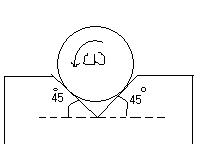hint:(friction is kinetic)
A cylinder of mass M and radius R is rotated in a uniform V groove with constant angular velocity ω.
The coefficient of friction between cylinder and each surfave is μ.
What torque must be applied to the cylinder to keep it rotating ?
-
UP 0 DOWN 0 0 4

4 Answers
Is the answer
√2 μ1 + μ2 MgR ???
not so sure as it does not involve ω .
i am getting simply √2μMgR...wer from are u getting such an answer?
my solution..
normal reaction's horizontal components balance each other
vertical component balance weight..
2Ncos 45°=Mg
so, N=1√2Mg
so, f=kinetic friction=μN=1√2μMg
torque by individual friction=f.R=1√2μMgR
so net torque due to 2 frictions=√2μMgR
so torque required to be applied in order to keep uniform rotation=√2μMgR
show wer i am wrong and also post ur solution aveek..a.k.a. bruce lee LOL